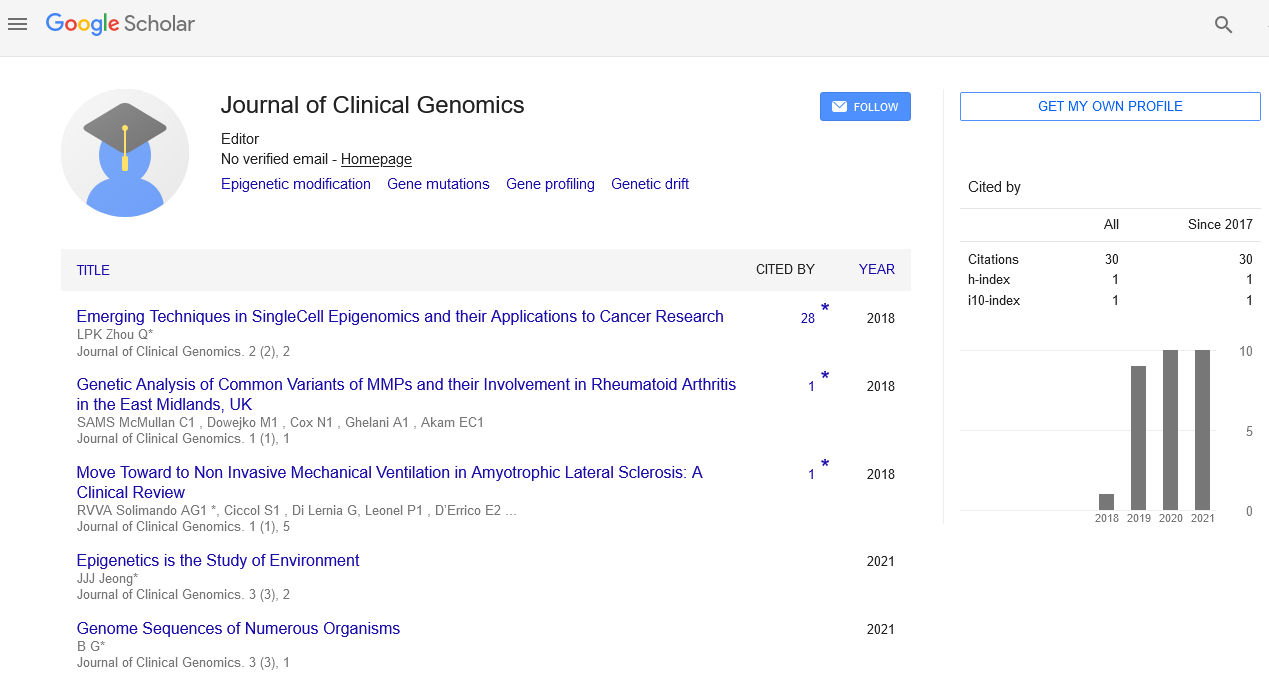Perspective, J Clin Genom Vol: 5 Issue: 2
Importance and Applications of Pharmacogenomics in Health Care
Yiyong Chen*
1Department of Genomic Science, Chinese Academy of Sciences, Beijing, China
*Corresponding Author: Yiyong Chen,
Department of Genomic Science, Chinese
Academy of Sciences, Beijing, China
E-mail: yiychen@23456.cn
Received date: 24 May, 2023, Manuscript No. JCG-23-107402;
Editor assigned date: 26 May, 2023, PreQC No. JCG-23-107402 (PQ);
Reviewed date: 13 June, 2023, QC No. JCG-23-107402;
Revised date: 20 June, 2023, Manuscript No. JCG-23-107402 (R);
Published date: 27 June, 2023 DOI: 10.4172/JCG.1000131.
Citation: Chen Y (2023) Importance and Applications of Pharmacogenomics in Health Care. J Clin Genom 5:2.
Description
Pharmacogenomics is the study of an individual's genetic makeup which influences their response to medications holds immense promise in revolutionizing clinical practice. By providing personalized medicine based on a patient's genetic profile, pharmacogenomics has the potential to enhance drug efficacy, reduce adverse drug reactions and improve patient outcomes. However, the integration of pharmacogenomic testing into routine clinical care is not without challenges. The various obstacles and opportunities encountered in implementing pharmacogenomics in clinical practice, emphasizing the importance of overcoming these challenges to fully harness the potential benefits of this emerging field.
One of the primary challenges in implementing pharmacogenomics lies in integrating genomic data into existing healthcare systems. Integrating genetic testing into Electronic Health Records (EHRs) and clinical decision support systems requires significant investments in infrastructure and expertise to manage, interpret, and act upon the genetic information effectively. Healthcare providers must also be trained to understand and utilize pharmacogenomic data to make informed treatment decisions. The use of genetic information raises ethical concerns regarding patient privacy and data security. Patients may be reluctant to undergo genetic testing due to fears of discrimination or misuse of their genetic data.
Clear guidelines and regulations are essential to safeguard patient privacy and ensure responsible use of genetic information in clinical settings. While pharmacogenomics has shown promising results for some medications, the evidence base for others remains limited. The lack of comprehensive data on drug-gene interactions may lead to uncertainty in clinical decision-making, hindering the widespread adoption of pharmacogenomic testing.
Implementing pharmacogenomics in clinical practice requires a wellinformed and competent healthcare workforce. Many healthcare professionals may lack adequate training and understanding of genetic testing and its implications for patient care. Addressing this knowledge gap through continuing education and training programs is important for successful integration. Patients need to be educated about the benefits and limitations of pharmacogenomic testing to make informed decisions about their healthcare. Raising awareness among patients and the general public can help reduce stigma and increase acceptance of genetic testing in clinical practice. Pharmacogenomic testing can be expensive and the lack of clear reimbursement policies may limit patent access, particularly in resource-constrained settings.
Pharmacogenomics offers the potential for truly personalized medicine, where treatment plans are essential to an individual's genetic profile. Addressing cost-related challenges and advocating for appropriate reimbursement policies is essential to ensure equitable access to pharmacogenomic testing. This approach can significantly improve drug efficacy, reduce adverse reactions, and optimize medication selection, leading to better patient outcomes. Adverse Drug Reactions (ADRs) are a significant cause of morbidity and mortality. By identifying patients at higher risk of ADRs through pharmacogenomic testing, healthcare providers can minimize the occurrence of these events, making drug therapy safer and more effective.
Pharmacogenomics can aid in drug development by identifying specific patient populations likely to benefit from a particular medication. This targeted approach not only improves the success rates of clinical trials but also helps pharmaceutical companies design more efficient and cost-effective drug development strategies. Understanding how a patient's genetic makeup affects their response to medications can also enhance medication adherence. When patients experience better treatment outcomes and fewer side effects, they are more likely to adhere to prescribed regimens. By avoiding ineffective treatments and preventing adverse drug reactions, pharmacogenomics has the potential to reduce overall healthcare costs. Shorter hospital stays, fewer emergency room visits, and less trial-and-error in treatment can lead to substantial cost savings. This advancement has implications beyond pharmacology, extending to other areas of healthcare including oncology, cardiology, and infectious diseases.
 Spanish
Spanish  Chinese
Chinese  Russian
Russian  German
German  French
French  Japanese
Japanese  Portuguese
Portuguese  Hindi
Hindi 